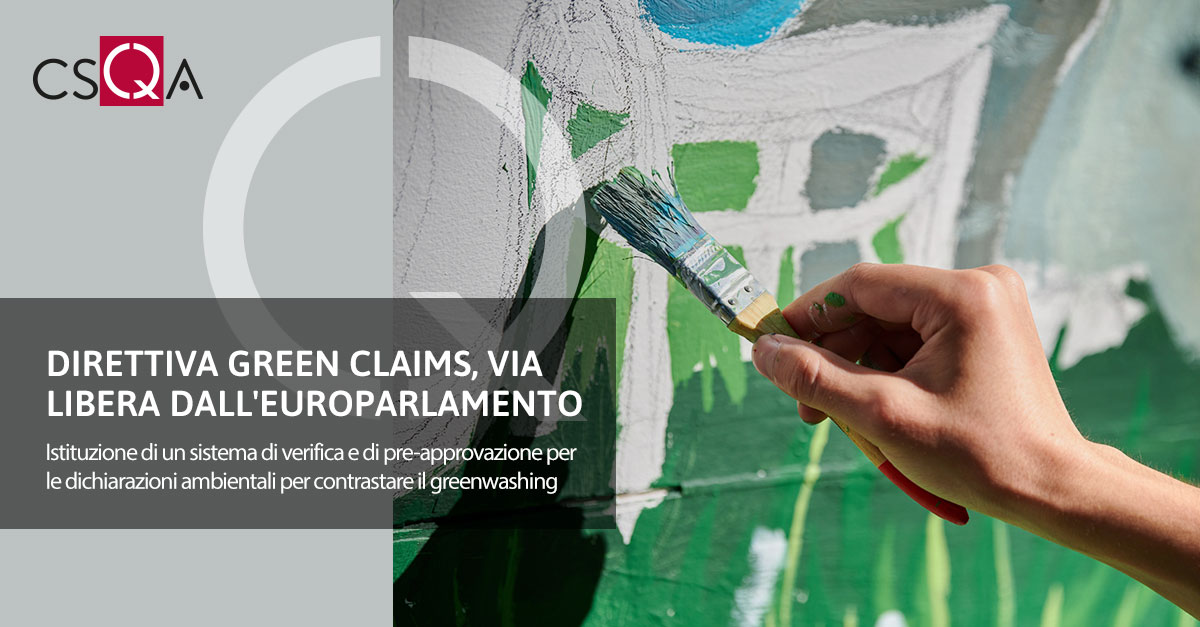 The European Parliament's green light for the Green Claims Directive against greenwashing arrived on Tuesday 12 March, with 467 votes in favour, 65 against and 74 abstentions.
The European Parliament's green light for the Green Claims Directive against greenwashing arrived on Tuesday 12 March, with 467 votes in favour, 65 against and 74 abstentions.Even if the legislation is coming to an end, this vote is important: the vote expressed in the plenary is in fact legally binding also in the following legislature .
After the vote on 6-9 June, the new representatives will pick up the dossiers where they left off to take them to the next phases, in this case the trilogue with the Council and the Commission, after the representatives of the national governments within the Council have also approved the own negotiating position.
What the new rules against greenwashing would provide
The Commission presented its proposal against greenwashing a year ago, after observing that the panorama of environmental declarations is worrying to say the least.
At least 75% of goods on the market as early as 2014 contained green declarations.
However, according to the EU executive, in 2020 at least 53.3% of the information on the environment and climate on the label on a large sample of products was misleading. And 40% completely unfounded.
What does the text approved by the European Parliament provide:
Scientific evidence. “Biodegradable”, “less polluting”, “water saving” or “based on organic raw materials”: we will no longer see such claims on products on the market unless the companies that produce them are able to justify them scientifically. According to the directive, in fact, and in this Parliament is in line with the Commission's proposal, when a company makes claims about the environmental performance of a product, it will have to provide scientific evidence of their veracity, taking into consideration the entire cycle of product life . And they will have to be verified by third parties (i.e. independent subjects);
Preventive demonstrations . The proof that the statements are truthful and scientifically reliable must be preventive, according to Parliament: that is, they must be provided before being able to market their products;
30 days. Member countries will have to identify the public entities required to evaluate the veracity of green claims . Parliament wants claims and related evidence to be assessed within 30 days, but simpler claims and products could benefit from quicker or simpler verification.
Exceptions for micro-enterprises . Micro businesses would not be required to comply with the new rules and SMEs would benefit from an extra year to comply than larger businesses.
Emissions compensation. MEPs confirm the European Union's recent ban (Directive Empowering consumers for the green transition) on making ecological declarations based exclusively on so-called carbon offset schemes. They add that companies will still be able to cite compensation schemes if they have already reduced their emissions "as much as possible" and use these schemes only for residual emissions (the European Commission, according to the text of the EU Parliament, would have one year after the entry into force of the directive to produce, together with the European Scientific Advisory Committee on Climate Change, a coherent methodology to define which emissions can be considered residual). The schemes' carbon credits must be certified , as established by the Carbon Removals Certification Framework (on which Parliament and the Council have recently reached agreement).
Fines . Companies that use unsubstantiated environmental claims to market their products could face fines of at least 4% of annual revenue , or exclusions of up to a year from participating in public procurement or subsidies.
- Dangerous substances . Parliament has also proposed that green claims on products containing dangerous substances will be allowed for the time being , with the Commission soon assessing whether they should be banned altogether. (Source: https://economiacircolare.com /)